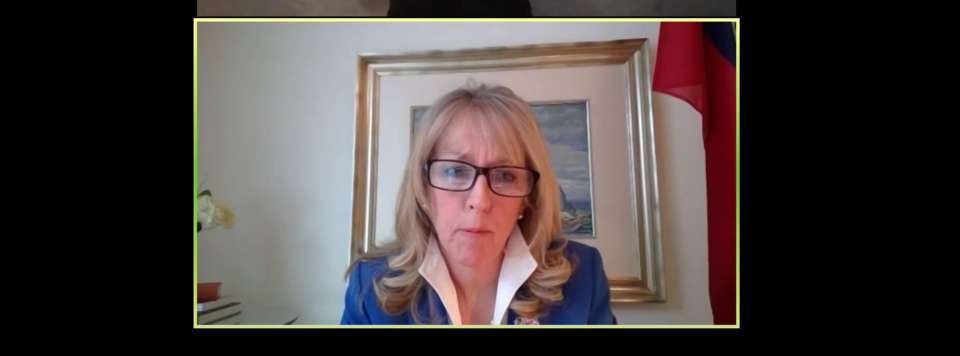Ontario’s minister of long-term care maintains the military is not a solution for the deadly COVID-19 outbreak at Roberta Place in Barrie.
Instead, Dr. Merrilee Fullerton said a local solution is the best and quickest way to get help to those inside the home where a variant strain of COVID has spread to infect nearly 200 people, resulting in 19 deaths at the 137-bed long-term care home.
“This is just such a tragic situation and it really speaks to the importance of doing everything we can to keep COVID out,” Fullerton said during a press conference on Thursday. “Clearly, the situation at Roberta Place happened very rapidly. … All the resources are being mustered locally so that we can have the fastest response.”
She expressed gratitude to the Canadian Armed Forces for helping in long-term care homes during outbreaks in the spring, but reiterated her position they weren’t required in this case.
“Though Canadian Armed Forces were certainly needed in the first wave, lessons learned point to local solutions,” said Fullerton. “It’s the speed, we need absolute speed. I continue to say we’ve got to act in COVID time.”
Roberta Place does currently have enough staff, according to the Simcoe Muskoka District Health Unit's associate medical officer of health, Dr. Colin Lee, but there’s still a call out for more help.
“There’s no ceiling to how much help we need… in an outbreak like this,” said Lee. “Care is complex at the best of times, let alone when you have many ill and a proportion of them severely ill … even if, for argument’s sake, we feel we have enough staff today.
"It’s incumbent on us to make sure we have more staff at the ready," he added.
Not only have 122 residents at the home tested positive for COVID-19, as of Wednesday, 69 staff/team members have also contracted the virus. There has been no new case reporting today.
The doctor said during an outbreak, caring for the residents of the home requires more staff than the regular contingent.
“I have spoken to people who have been on the inside… there are certain activities, medical duties, that have to be done and they’re having to prioritize,” said Lee. “It has been difficult because they all want to provide the best care to everyone there.”
Roberta Place has had assistance from Georgian College, Orillia Soldiers’ Memorial Hospital, Royal Victoria Regional Health Centre, Red Cross, Simcoe Hospice, and others since the start of the outbreak.
Fullerton said the province has been working with long-term care homes and the entire health-care system since the first wave of the pandemic to add “layers of protection,” from testing to infection prevention measures and vaccination.
“It’s important to address air travel and understand the impact it has on community spread,” she said. “(This) is a stark reminder of how quickly things can spread around the world and spread in our community and into our homes. … Ultimately, the community spread is the biggest threat to long-term care staff and homes, so everyone has a role to play.”
Both Fullerton and Lee say infection protocol was followed and the layers of protection were in place for the home, which is located on Essa Road in Barrie's south end. But it didn’t stop one of the fastest – if not the fastest – spreading outbreaks in a long-term care home in Ontario.
“I’ll be honest with you, with the rapid speed it went, knowing this home did everything it needed to do to prepare, I doubt it would have prevented an outbreak,” said Lee. “How much could have been prevented? It’s hard to know.”
The doctor did state, however, if the residents at Roberta Place could have been vaccinated before the outbreak occurred, the outcome would at least have been less severe.
According to Dr. Charles Gardner, medical officer of health for Simcoe Muskoka District Health Unit, after one dose of the Pfizer vaccine, there’s an 85 per cent protection level for the person who received the vaccine. After two doses, it offers 95 per cent protection.
There was delay, though, when it came to vaccinating long-term care home residents in Simcoe-Muskoka. After being promised Moderna vaccines, the health unit made a plan to use their supply of the more portable Moderna to vaccinate long-term care home residents. That supply was rerouted, and the health unit had to wait until early January to find out they could move Pfizer-BioNTech vaccine into homes.
Fullerton said the vaccine distribution has “moved at lightning speed” and noted long-term care home residents in Ontario’s hot-spot regions have received their first dose of vaccine. She said the province is still on track to give at least one dose to all long-term care residents in Ontario by Feb. 15.
“We continue to make long-term care residents and high-risk retirement home residents the priority,” said Fullerton, as she also called on the federal government to do what is necessary to get more vaccine supply. “We could be vaccinating more now, but we don’t have the vaccine available to us in the pipeline.”
